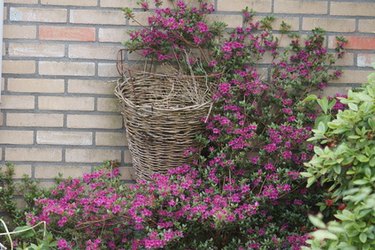Things You'll Need
Pruning shears or loppers
Copper-based fungicide
All-purpose fertilizer
Organic mulch
Soil pH test kit (optional)
Lime, peat moss or aluminum sulfate (optional)

Azaleas are flowering perennials that are rather hardy, but they do require some care, especially as they grow older. Restoring the health and vitality of old azaleas is a multiple-step process. Your old azalea needs a boost of nutrients, plenty of moisture and pruning. Older azaleas can become overgrown, spindly and even become covered in moss. Your main objective in restoring your old azalea is to remove old and dead growth to encourage new, healthy growth.
Step 1
Cut away all dead, overgrown or weak branches in late winter or early spring. Prune half of the oldest limbs and shoots down to the ground. Apply a copper-based fungicide to the wounds.
Video of the Day
Step 2
Feed your old azaleas a full dose of all-purpose fertilizer in June, in August and again in October. Follow the dosage instructions on the package.
Step 3
Water once every week or two weeks to keep the soil moistened. Spread a thick, 3- to 4-inch layer of organic mulch around the base of the plant, covering the root system.
Step 4
Trim back spent flowers and stems down to the next set of buds in late spring or early summer, right after the azalea finishes blooming.
Tip
You may also want to monitor the soil pH to restore your old azalea. Purchase a soil pH test kit. You’ll want to achieve an optimal soil pH for your old azalea of 4.5 to 5.5, which is fairly acidic. Add lime to your soil to increase the pH (make it more alkaline), or add peat moss or aluminum sulfate to decrease the pH (make it more acid).
Use fertilizers for acid-loving plants on your azaleas, and mulch with pine straw.
Warning
Don’t forget to inspect your old azalea for signs of diseases and pests. Treat any disease or pest infestations right away with proper pruning, fungicides or insecticides to restore your old azalea’s health and vigor.
Video of the Day